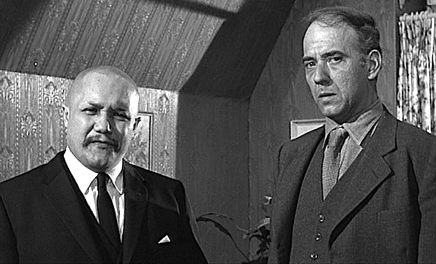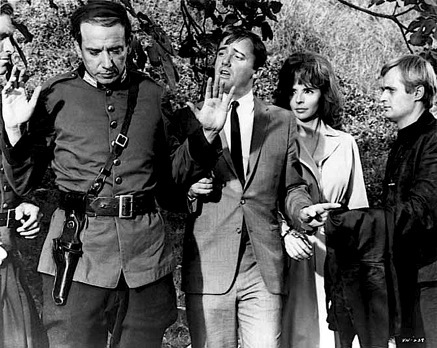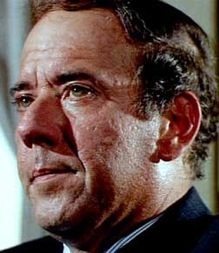Albert Paulsen
d. April 25, 2004
Albert Paulsen, character actor who became an industry and viewer
favorite portraying distinctive villains on classic television series,
died April 25 in a nursing home in Los Angeles. He was 78.
His accent, appearance and demeanor often typed him as World
War II German officers and Iron Curtain spies, but Paulsen was born
in Ecuador. "From the age of eight or nine, I began building cardboard
theatres, imagining myself an actor in the United States of America,"
he told an interviewer. He attended German boarding schools and
arrived in Los Angeles in 1942 at age 16. He joined the U.S. Army,
served briefly before the war ended, and used the G.I. Bill to study
acting in New York at Sanford Meisner's Neighborhood Playhouse
and Lee Strasberg's Actors Studio.
Paulsen worked on and off Broadway throughout the 1950s and
appeared with Geraldine Page and Luther Adler in a 1964 Broadway
production of Chekhov's "The Three Sisters" directed by Strasberg
(and filmed in 1966 with Paulsen and much of the original stage cast).
He created a one-man show portraying novelist Vladimir Nabokov that
debuted in Los Angeles in 1982 and toured nationally.
Paulsen tried Hollywood in 1961 and quickly established himself as a player
of memorable villains who display a glib surface charm and an ambivalent ruthlessness. He made his film debut with a small part in the 1962 Warren Beatty picture "All Fall Down," then found his milieu later that year in "The Manchurian Candidate," the masterpiece of all 1960s spy movies, combining Cold War paranoia with sly black humor. Paulsen's portrayal of a Soviet agent proud that his New York apparatus actually turns a profit and bemused by the arrival of a jovial Chinese agent played by Khigh Dhiegh was the first of many such roles to follow, although most of them were on TV.

He had a handful of other notable film roles, including a Cuban officer in "Che," a sadomasochistic killer in "The Laughing Policeman," his typical Communist agent character in the otherwise silly "Mrs. Pollifax, Spy," an angry villager in "Young Frankenstein," and a vicious ganglord in "Gunn," Blake Edwards’ 1967 feature version of Peter Gunn.
On television, Paulsen had a 25-year run portraying gangsters on The Untouchables, 77 Sunset Strip, The FBI and N.Y.P.D.; Wehrmacht officers and Gestapo agents on The Gallant Men, Combat, 12 O'Clock High and The Rat Patrol; and even some lighter roles in episodes of The Farmer's Daughter, The Flying Nun and The Odd Couple. He also appeared in episodes of General Electric True, The Lloyd Bridges Show, Kraft Suspense Theatre, Run for Your Life, The Trials of O'Brien and The Name of the Game.
He won an Emmy for his role as a tough guard at a Russian gulag in the 1963 production "One Day in the Life of Ivan Denisovich," seen on Bob Hope Presents the Chrysler Theatre. Ten years later he played Soviet Ambassador Anatoly Dobrynin in "The Missiles of October," the acclaimed ABC special dramatizing the Cuban Missile Crisis.

Paulsen is best remembered as a canny but fallible villain in numerous spy shows: a Balkan secret policeman in an early episode of The Man From U.N.C.L.E., a Hong Kong nightclub owner and drug dealer in I Spy, and another narcotics kingpin in Amos Burke, Secret Agent. He returned to Chrysler Theatre in "Memorandum for a Spy," a two-parter released as an overseas feature under that title. And he was the villain in no less than four episodes of Mission: Impossible. Ironically, those all came after his first appearance on that series, not as the bad guy but as an alcoholic American agent with a photographic memory who joins the Impossible Missions Force in a plot to topple an Eastern European dictator. Paulsen considered it "the best part I ever had on the show," as he told Patrick White in The Complete Mission: Impossible Dossier. "A drunk, but not a villain."
Paulsen's last feature role was in 1981's "Eyewitness," where he reunited with Steven Hill, Mission's original star and a friend and classmate from their Actors Studio days. The two also appeared together in a 1965 Kraft Suspense Theatre segment.
Paulsen was back on U.N.C.L.E. in its final episode, as one of the plotters of a misguided effort to force peace on the world. He also appeared in the short-lived World War II spy adventure Jericho, the high-tech international intrigue series Search and in several episodes of the long-running cops-and-spies favorite Hawaii Five-0. He was also the chief villain in Peter Graves' 1966 "Call to Danger" pilot that was seen several times in CBS summer-replacement series.
In the 1970s, Paulsen appeared in episodes of The Rockford Files, Columbo, Kojak, Medical Center, Kolchak: The Night Stalker, Police Story, Switch, Wonder Woman and others. In the 80s, he still was playing the classy villain in lesser adventures such as Airwolf, Knight Rider and Scarecrow and Mrs. King.
Paulsen's only prime-time series role was in 1975's Doctors Hospital, a short-lived and long-forgotten NBC medical drama. He played the director of a Los Angeles hospital that employed a typically tough-but-dedicated surgeon played by series star George Peppard. Paulsen did, however, take regular roles in two daytime serials. He was part of the original cast of ABC's unsuccessful 1970 soap opera A World Apart, and some of his last TV work was seen in 1988 in ABC's veteran soap General Hospital.




